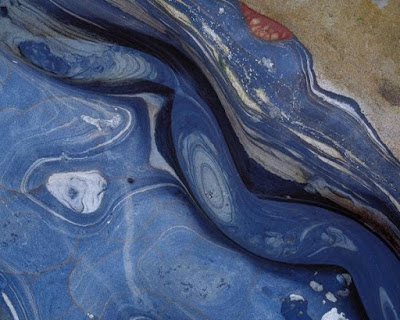My guest blogger, Lorraine Anderson, has just released a beautiful and inspiring anthology, Earth and Eros, with color photographs by Bruce Hodge. Anderson has an incredible gift for creating ground-breaking anthologies: she edited the renowned Sisters of the Earth, one of the first anthologies of women's writings on nature, and one of the most important books I've ever read. Earth and Eros is equally seminal. ~ Marybeth
There it was
again, the Hallmark version of Eros: the winged boy with arrows in his quiver
meant to strike lust into young hearts. In this guise, dreamed up by the later
Greek satiric poets, Eros enjoyed wreaking havoc in the Greek pantheon, smiting
the gods with inconvenient desires and provoking unrequited loves. Zeus falls
for the mortal Semele; Venus falls for the mortal Adonis. Tearing and rending
of garments ensues, as do offspring: from the former couple, Dionysus, that
hearty partier.
But this is a
trivialization of Eros that obscures its power to move postmodern people toward
a rapprochement with the natural world. In the most ancient Greek stories, Eros
is a fundamental cause in the formation of the world, representing the power of
love to unite discordant elements and bind humankind together. It’s that sense
that we urgently need to recover today. Properly understood, Eros is a force of
nature, the innate life
force that connects us to ourselves, to other human beings, to all other living
beings on the earth, and to the earth as a living being. Eros is fuel for a
revolution of the heart. And sex plays an essential role in that revolution.
Native American poet Sherman Alexie refers to sex as “the fog-soaked forest into which we all travel,” “the damp, dank earth into which we all plunge our hands / . . . / to search for water and room and root and home.” Sexuality is basic and universal, and its great beauty is that when we are naked, vulnerable, and aroused, when we are out of our minds and fully in our bodies, we are perhaps closest to our own nature and our own wild hearts. In that moment we know for certain that we are part of, not above, the animal kingdom.
All of the environmental sins of our time spring from holding ourselves above and separate from the great body that provides for our every need. When we see ourselves that way, we impose our own self-serving plans on the natural world. The catastrophic results are all around us. Sexuality draws us into relationship and makes us see that we are part of—not apart from—nature. When we understand that what we do to nature we do to ourselves, we are much more likely to respect and hold sacred the land and other beings. We are much more likely to listen to and cooperate with the great intelligence that informs all life around us.
So next Valentines Day, go outside. Listen. Listen to your own beating heart, to your deepest longings, and to the world around you. Listen hard. Listen as if your life depends on it.
Lorraine Anderson is editor of the new
book Earth& Eros: A Celebration in Words and Photographs,
which brings together prose and poetry by nearly seventy authors—including Gary Snyder, Terry Tempest Williams, Pablo Neruda, Diane Ackerman, D. H. Lawrence,
and Louise Erdrich—to celebrate the sacred erotic dimension of humans’
relationship to the earth. Foreword by Robert Michael Pyle and photographs by
Bruce Hodge.


